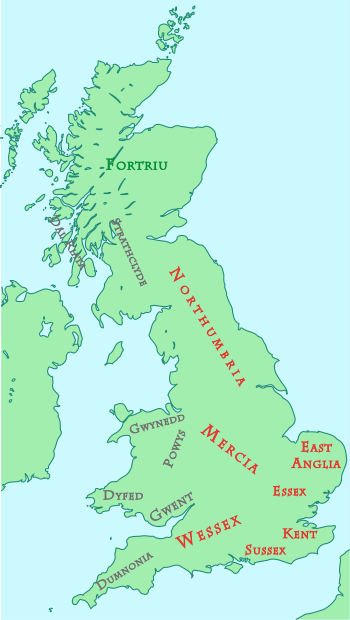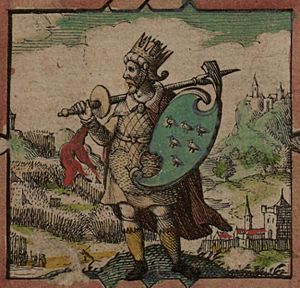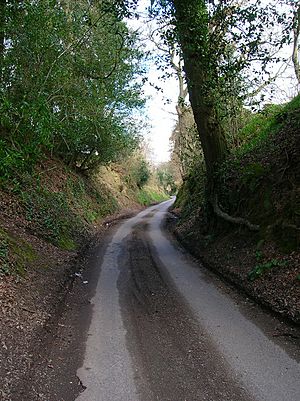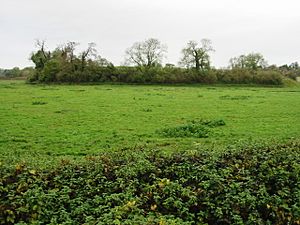Kingdom of Sussex facts for kids
Quick facts for kids
Sussex
|
|||||||||||
|---|---|---|---|---|---|---|---|---|---|---|---|
| c. 477–860 | |||||||||||

Britain around AD 800
|
|||||||||||
| Status | Vassal of Wessex (686–726, 827–860) Vassal of Mercia (771–796) |
||||||||||
| Capital | Chichester Selsey (seat of South Saxon bishopric) |
||||||||||
| Common languages | Old English (Ænglisc) | ||||||||||
| Government | Monarchy | ||||||||||
| Monarchs (see full list) | |||||||||||
|
• 477–491 or later
|
Ælle | ||||||||||
| Æðelwealh | |||||||||||
| Legislature | Witenagemot | ||||||||||
| Historical era | Heptarchy | ||||||||||
|
• Established
|
c. 477 | ||||||||||
|
• Subject to Wessex
|
c. 686 to 726 | ||||||||||
|
• Subject to Mercia
|
771 to c. 796 | ||||||||||
|
• Subject to Wessex
|
From c. 827 | ||||||||||
|
• Full integration into crown of Wessex
|
860 | ||||||||||
| Population | |||||||||||
|
• 450
|
25000 | ||||||||||
|
• 1100
|
35000 | ||||||||||
| Currency | Sceat | ||||||||||
|
|||||||||||
| Today part of | ∟ South East England |
||||||||||
The Kingdom of Sussex was an important early kingdom in Anglo-Saxon England. It was also known as the Kingdom of the South Saxons. This kingdom was one of the seven main Anglo-Saxon kingdoms, called the Heptarchy.
Sussex was located on the southern coast of Great Britain. It began as a Saxon settlement in the 6th century. Later, it became an independent kingdom. The kings of Sussex ruled the area for many years. Eventually, the powerful kingdom of Wessex took over Sussex. This likely happened in the year 827, after a battle known as the Battle of Ellandun.
Life in Early Sussex
Around the end of the 4th century, the number of people in Roman Britain started to go down. This happened for several reasons. Many armies were sent from Britain to Europe. Also, diseases like the plague and attacks from other groups made the population smaller.
The total number of people in Britain dropped a lot around the 4th century. It went from about 2 to 4 million people in the year 200 AD to less than 1 million by 300 AD. Sussex also saw a big drop in its population during this time. By the year 450, Sussex probably had about 25,000 people. This number slowly grew to about 35,000 by the year 1100. When the Domesday Book was created in 1086, Sussex had many people living close together.
Dealing with Attacks
The first recorded attack by Vikings on Sussex happened in 895. It was hard for scattered farming communities to defend against these sudden raids. In 895, the people of Chichester fought back. They killed many hundreds of Danes who were stealing from the area. A Saxon noble named Eadulf was chosen to organize Sussex's defenses. Sadly, he died from the plague before he could do much.
Cultural Connections
There is good evidence that the Kingdom of Sussex was influenced by the Franks. The Franks were a powerful group in what is now France. The nearby kingdom of Kent also showed Frankish influences. Some old writings from Europe suggest that Frankish kings might have seen the people of Sussex as part of their lands.
The way people showed their wealth and status was different in Sussex. In Sussex and Kent, fancy clothes, jewelry, and metal items were simpler. They were not as decorated as in kingdoms further north. However, people with high status in Sussex used other ways to show their importance. For example, archaeological finds show that they ate special, expensive foods. They also built impressive buildings, like a tower found at Bishopstone.
From the early 6th century, items from the Merovingian Franks were found in Sussex. These items were also found in Kent and on the Isle of Wight. This shows that there was a lot of trade and exchange between Saxon Sussex and Frankish Gaul (modern-day France). Old burial sites show that these connections with Gaul continued for a long time, from the early 5th century to the early 7th century.
Images for kids
-
Harold Godwinson, who would become king, riding to Bosham in 1064, shown on the Bayeux Tapestry.
See also
 In Spanish: Reino de Sussex para niños
In Spanish: Reino de Sussex para niños
 | Bayard Rustin |
 | Jeannette Carter |
 | Jeremiah A. Brown |






